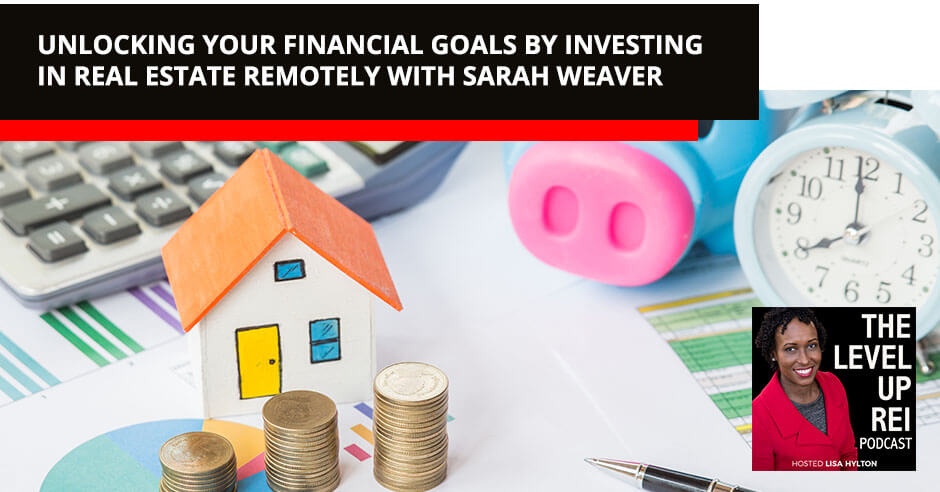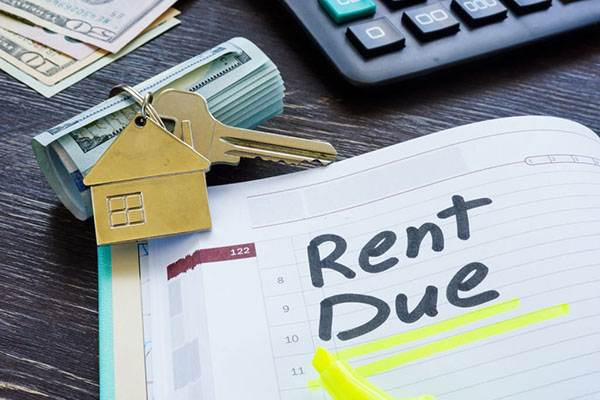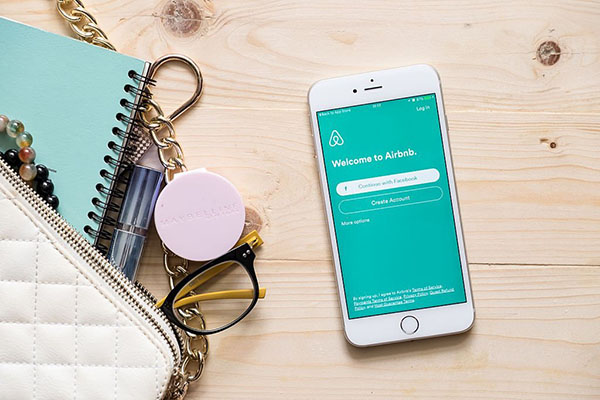
Who says you can’t have fun while doing real estate investing? Our guest in this episode is living proof you can do just that, even remotely! Join your host Lisa Hylton as she sits down for a conversation with Sarah Weaver on how you could successfully invest in real estate remotely. Sarah is a coach, speaker, real estate investor, entrepreneur, and business owner. In this conversation, she shares in-depth insights on building your business in that remote space so you can live the life you have always dreamed of. Equip yourself with the knowledge you need to achieve your financial goals, so tune in!
—
Watch the episode here
Listen to the podcast here
Unlocking Your Financial Goals By Investing In Real Estate Remotely With Sarah Weaver
I’m super excited to have Sarah Weaver on the show. She builds big businesses and lives a big life. She is a coach, speaker, real estate investor, entrepreneur, and business owner. Nothing thrills Sarah more than helping real estate agents and investors design the life of their dreams, whether that’s making more money or working fewer hours. I am super excited to have you on. I remember vividly meeting you at FinCon at one of the after-hour drinks and learning so much about all the things that you’ve done. I was like, “This lady is amazing.” Welcome to the show.
Thank you. It’s been an incredible ride and so much has happened since we met. I’m excited.
In this episode, I want to talk a lot about your strategy for investing in real estate and how you personally invest. When I started, I said big businesses and an even bigger life. You spent a lot of time on the road by choice because you like a remote, nomad living lifestyle, not being fully attached to any specific place.
I would love to talk about that, how you’ve been able to build your businesses in that space, then some of the new businesses that you’ve started, and how you’re seeking to help real estate investors along their journey and along their way. Where do we get started? We got started with how you even got started in investing in real estate, to begin with.
I used the house hacking strategy. I bought a house and lived in it. I had roommates. I was the best roommate because the best type of roommate is a roommate who pays rent and is never there. I made sure the mortgage was paid because I owned the house. I spent a lot of that first year traveling and working from Europe. Back in 2015, I started working remotely. My W-2 job was for a US-based company, but they didn’t care where I lived. I could be anywhere.
I bought my first house ten hours away from where I was living. I was living in Denver, Colorado. I couldn’t make the numbers make sense. I didn’t know what I knew now about investing. I bought a house in Kansas City. There was a moment when I was in Europe and I was like, “This is working.” I’m getting my mortgage paid for. I was making $200 over my PITI, $200 in cashflow, and living my dream of working and living remotely.
Believe in your ability to build wealth through real estate. It may not happen fast, but you’ll get there. Share on XYour PITI, that’s mortgage, interest, taxes. That was your first foray. From there, how did the bug continue?
I always believed in the ability to build wealth through real estate, but it didn’t happen fast. In a lot of headlines out there, even in my own story, people always talk about how quickly I scaled in 2021. The truth is it was a slow start. I bought one in 2017 and bought one again two years later in 2019. In 2021, I did go from 3 units to 15 units in less than 90 days. That was fast.
That first a-ha moment of you can buy a property, your tenants are not only paying your monthly payment of principal, interest, taxes, and insurance, but then they’re also paying down your principal. You’re getting tax benefits and the property is appreciating. It was a no-brainer for me to continue to do that. Now I’m addicted.
You started in 2015. It was doing a couple of singles. By 2021, you went full ham and picked up a time. Could you talk about the process of picking up so many? What was different or similar about your strategy in 2021 versus previously?
For the first two houses, I bought a single-family and a duplex. I did an owner-occupied, conventional loan, 3% down. In 2021, I bought a fourplex with 3.5% down, also owner-occupied, using the FHA loan. After that, I used hard money and private money to buy two duplexes and then I used an equity partnership to buy a fourplex.
You are an educator. You helped a lot of real estate agents learn how to get into the space of purchasing homes. For a lot of people, hard money and going the alternative route to going through a bank brings up a lot of fares for them. Can you talk about maybe some of the ways in which you navigated that terrain?

Remote Real Estate Investing: Use the house hacking strategy. The best type of roommate is a roommate who pays rent, and there’s never there. Make sure the mortgage was paid because you own the house.
What I found is that the numbers are what comes down my fear. To say I wasn’t scared would be an absolute lie. I was scared the entire time I was doing that project. I was using hard money, private money, and doing a long-distance BRRRR, which is a large rehab, with the hopes of increasing the value of the property and then refinancing into a different loan product. Across that, there are so many things that could go wrong. I was scared. I want people to know full and well that I was scared. What allowed me to keep functioning in the fear was the numbers. I was scared and I did it anyway. If you’re looking to invest in real estate, you have to learn how to analyze deals.
That leads me nicely to analyzing deals. Talking to people who want to be active, can you do a high level in terms of what they need to be looking for and maybe what you decide to pass on in this market environment?
It’s going to depend on so many factors. Does someone want to do long-term, medium-term, or short-term as far as our investment strategy? Are they doing a flip? How much money do you have? For me, if I’m doing a long-term buy-and-hold, I want something that’s 10% cash-on-cash or higher. If I’m doing a medium-term, then I want it to be 17% cash-on-cash or higher. If it’s short-term, I’m hoping to see over 25%. These are in second-tier and third-tier markets. I’m not seeing these cash-on-cash numbers in Boise, California, San Francisco, LA, and Austin. I want people to know that I am finding 14% cash-on-cash, but I’m finding that in Des Moines, Iowa.
What characterizes a second-tier and third-tier market?
I’m sure that someone fancier than me has an eloquent answer. For me, is there less than 6% appreciation? There’s probably a metric of population. When we talked first-tier, you’re seeing double-digit appreciation year over year and a huge increase in population. People want to move there. That’s what I consider a first-tier market. A second-tier market’s going to be your St. Louis, Kansas City, Cincinnati, Ohio, De Moines, Iowa.
When people are investing in these markets, would you say it’s safe to say that you’re going in for cashflow? Hence, your metrics are 10% cash-on-cash long-term. This is all connected to cashflow. Whereas if you were trying to double your money, flip, for instance, you probably wouldn’t be doing these markets, correct or not?
It’s okay to be scared while doing a real estate project. You could sense a lot of things that could go wrong. You should function with fear. Be scared but do it anyway. Share on XCorrect. I am not a flipper. I’m anti-flipping. I am looking for cashflow, so I’m not investing for appreciation. We hope that appreciates. If it doesn’t, I’m okay with that.
Why are you anti-flipping?
People have made great money flipping houses. It’s a job. I invest in real estate to build wealth and create a passive or semi-passive income. I already have a job. I don’t want another job. When you flip a house, you might make great money, and then you’re taxed on that money like you are on any other active income. It’s another job. It’s not a way to build wealth. I have yet to talk to a flipper who has been doing it long enough and who hasn’t said, “I wish I would have held onto some of the houses I flipped.”
This brings me to building businesses that enable you to then live this lifestyle of being nomadic. Is nomadic the right word?
That’s a nice word. I’ve been called homeless, a wanderer. I like nomadic.
Do people ever ask, “Maybe you want roots sometime?” Do you ever get those questions from people?

Remote Real Estate Investing: Invest in real estate to build wealth and create a passive or semi-passive income.
Every day. People are like, “Aren’t you tired?” I am tired. It’s addicting. I got invited to Costa Rica. I’m going to Iceland and Thailand. A regular Tuesday for me is salsa dancing in Central America. Whereas for some people, that’s not their yearly vacation. That’s like a bucket list vacation. That’s just a normal Tuesday.
What are the processes and systems that you’re putting in place to enable you to be in a position where you can run businesses and buy homes remotely?
For buying real estate, you have to have a great on-the-ground team. My on-the-ground team starts with an investor-focused real estate agent. They’re introducing me to general contractors, contractors, cleaners, handymen, property managers, attorneys, photographers, you name it. Those people have to be there because something bad is going to happen with a property that you buy. It’s not a matter of if it’s going to happen. It’s a matter of when. When it happens and I’m in the jungle in Guatemala, who can I text to make sure that my tenant can get connected with a handyman so that it can fix the issue because I’m thousands of miles away? That was first and foremost.
We’re into the management piece of the property. Can you talk about systems in place for that?
The tenants are extracted. Do they always listen? No, but they are instructed to do maintenance requests through Apartments.com. That email inbox is monitored by my assistant. My assistant has a vendor list of people that she is instructed to contact. For example, we had the AC go out at a property. That’s urgent. It’s summer. It’s super-hot in Kansas City. That is a thing of urgency. We know exactly who to call. If they are not available, there’s a list of other AC repairmen that they can call.
One thing that I thought was so fascinating about what you’ve done is that you’ve created a Google Sheet of all your different vendors. That then enables you to have that assistant who can then independently be able to feel some of these calls then and be able to take care of this stuff while you might be in that jungle, having a good time.
You're not meant to feel lonely. That's not how life is meant to be lived. Life is meant to be lived in a community. Share on XI want to make it clear. I’m always available. I was in the jungle when I got a text message from one of my tenants. She was supposed to use Apartments.com, but she texted me, but I was away from my phone for four hours. I want to, but I’m not yet going on multi-day hikes without cell service. I want to get there. My goal is to hike Patagonia. I’m taking a group of investors with me. I need my business to be at a place where I can be completely off-grid for 5 to 6 days.
A couple more things I want to touch on are the difference between mid-term and short-term rentals and recognizing when to deploy a mid-term type of rental strategy versus a short-term rental strategy.
First, the similarity is that they’re both furnished. These are furnished rentals. If you are the landlord, you’re likely handling all of the utilities. You’re providing paper towels, toilet paper, coffee, and anything that would be in an Airbnb. Airbnb and VRBO are short-term rentals. They might be two days. They might be two weeks. That’s a short-term rental. Medium-term rental is 30 days or longer. It used to be called corporate housing. Now, it’s more traveling nurses, people that are in-between homes. Maybe they sold their house, but they haven’t yet bought their other house. I’ve housed that couple. That’s medium-term.
You’re still paying for utilities. You’re still providing some of the paper products, but I call it a starter kit. You’re not providing toilet paper for the entirety of their stay. That’s a medium-term tenant. Why I like medium-term as a strategy is we have a lot of cities and counties across the United States that are restricting the ability of a landlord or a homeowner to rent out on Airbnb or use the short-term rental strategy. A loophole or a way around those regulations is renting your house out for 30 days or more.
Have you also experienced times where the medium-term can be more lucrative than the short-term?
Yes. The reason that it can be more lucrative is that occupancy rates drop in the winter in some places. For example, I have an Airbnb. It’s a one-bedroom, one-bath in Omaha, Nebraska. In the summer, I’m occupied. I was at a 97% occupancy. You have the College World Series and a lot of sporting events. I’ve housed a lot of couples that were driving from Chicago to Denver because I allowed one-night stays. Omaha would be their medium stopover before they kept going on their road trip. I was busy and occupied.

Remote Real Estate Investing: Medium-term as a strategy is good because we have a lot of cities and counties across the United States that restrict the ability of a landlord or homeowner to rent out on Airbnb or use the short-term rental strategy.
August and September hit and my occupancy dropped. My Airbnb is empty. When your Airbnb is empty, you’re not making money. That’s when I switched to the medium-term rental strategy. You’re 100% occupied for three months because they’re typically staying for thirteen weeks. Something magical happened. Someone would move out and I immediately would get another traveling nurse to move in the next day.
Plus, I’m envisioning you also have fewer turns. Each time you’re turning that cost into money for cleaning and depending on the market, maybe that cleaning fee is not super-duper high. It’s like almost a wash somewhat.
Also, I call it mind space. It was the College World Series in Omaha, Nebraska. My phone was constantly buzzing. “Where’s this? Where do you recommend for this? We can’t find the remote. How do we turn off the AC?” It’s constant, whereas a traveling nurse or someone that lives in your unit for thirteen weeks might have questions at the beginning, but they’re not going to be texting you every week. That is what an Airbnb guest is because you’re getting a new Airbnb guest every few days.
Someone loves the idea of Airbnb. They probably want to launch something. Maybe it’s going down the medium-term with nurses or maybe it’s on the short-term side with Airbnb or Airbnb that can also do medium. One of the hurdles that many investors go through is furnishing. That is a solution that you’ve decided to solve. Can you talk about why you decided to go down this path of providing this solution?
I own a company called Arya Design Services. We furnish Airbnbs and medium-term, any furnished rental for investors all over the country. It came because people were asking for it. I posted photos of my one-bedroom, one-bath that I decorated from 8,000 miles away. They said, “Can you do that for me?” My first reaction was, “No.” I realized, “What would an entrepreneur do? An entrepreneur would read Dan Sullivan’s book, Who Not How?”
I would think, “Who do I need to hire? Not, how am I going to do that?” That’s exactly what I did. I started a company. Now we do that for clients. In addition, we also will analyze your property for you. I love your question, “How do you figure out if it’s going to be good?” My company would look at your portfolio and let you know what your numbers would look like if you switched it to a medium-term rental or a short-term rental.
That’s good because I do have friends who have bought properties. At the time they bought it, they weren’t ready to do all of the different things because maybe they were working. Many times, you are working and have a lot of other responsibilities. That’s where companies like yourself, it’s like, “Do you want to wait three months and not have any income, or do I pay this company who helps me, so I’m not doing all the house?” I get a “who” to do it and then I get it on the market, maybe two months, three months earlier than I would have gotten it on the market if I waited for myself to get around to doing everything. That’s powerful.
From there, one of the things I love about you is that you’re good at creating communities. We were talking about some of the things that you are working on. You’re taking a group of investors to an international location. Can you talk about the genesis and why you decided to start with these two projects, 1) creating events for investors and 2) providing opportunities for people to travel abroad with you?
One of the things that are so important to me is living a big life. Especially in the US, we’re constantly told like, “Work and work.” I’m like, “Where is the play? When do we get to have fun?” The pandemic happened. The pandemic told a lot of people to stay home. People are yearning for travel, but more importantly, people are yearning for community. I do one-on-one consultations with investors and 80% of them have said in some capacity that they’re lonely. I’m thinking, “You’re not meant to feel lonely. That’s not how life is meant to be lived. Life is meant to be lived in community.”
I’ve been to 44 countries on 6 continents. I knew that with my experience of traveling, to say I travel is an understatement. I’m always traveling. People are always saying, “That’s so cool. I’ve always wanted to do that.” I can say, “Would you like to come?” I put together two different events. One is called Co-Work, Co-Live. People can come with their job.
A lot of people were given the gift of being able to work remotely. I had an attorney, a project manager, a media buyer, and a graphic designer. They all can join me in Guatemala. We all shared a villa. Most people stayed anywhere between 5 and 10 days. We worked. You work during the day like you would back in your hometown, but then something cool would happen.
At the end of the day, we would close our computers and have dinner together. We would be talking about syndications, funds, cashflow, life goals, or this great book we read. Where did you find your virtual assistant? What types of things do you give your virtual assistant? All of these types of conversations were happening around the dinner table. That is why I do what I do.
I remember seeing the Guatemala trip so much. I was like, “That’s so interesting.” I love it. In all of this, you have created different businesses. You’re continuing to invest in real estate. Can you talk about maybe some of the lessons that you have personally learned in systems hiring and putting systems in place to scale and create even more businesses as you’ve gone along?
I will be the first to say that I didn’t hire fast enough. My biggest advice to entrepreneurs and investors reading is to hire for the business that you want to have, not where your business is now. I knew that I was building a big business and we were going to serve a lot of clients, but I was hiring small because that’s what I thought I was supposed to do. Keep expenses low. The reality is if I had hired good talent five months ago, I probably would be so much further than where I am now.
Before I get into my Level Up questions that I ask all my guests, is there anything I didn’t ask you that would be good to share?
When I talk about travel, some people are like, “That’s good for her. I have kids. I have this.” Whatever travel is for you, maybe it’s reading a book on a Saturday morning, going on a long walk with your kids, or going on a bike ride by yourself, please pull out your calendar and carve out time for that thing that lights up your soul. That’s my hope for everyone reading.
This brings me to the Level Up questions that I ask all my guests. The first is, what are you grateful for in your life now?
I’m so grateful for my friends. I have a friend for every piece of my life. If I have a question about business, I call this person. If I have a question about property management, I call this person. If I want to vent, I have this person. I have friends in every facet of my life. I’m grateful.
What do you attribute to your success and continuous growth?
My confidence in my abilities. Especially as women, we oftentimes allow ourselves to limit our belief in ourselves. The reality is that everyone, especially women, has that whisper like, “I could do that.” I listened to that voice.
What do you now know that you wish you knew at the beginning of your journey?
Using other people’s money is possible and not scary and I would have scaled so much faster had I known how to do it.
If my readers want to learn more about you and all your different businesses and offerings, where’s the best place they can go to learn more?
The two places would be my website and my Instagram. Both of them are Sarah D. Weaver. SarahDWeaver.com and @SarahDWeaver on Instagram.
Thank you so much for coming on. I appreciate it.
Thank you, Lisa. I appreciate you having me.
Important Links
About Sarah Weaver
 Sarah is a coach, speaker, real estate investor, entrepreneur, and business owner. Nothing thrills Sarah more than helping real estate agents and investors design the life of their dreams whether that is making more money or working fewer hours (or both!). She is a hiring and real estate investing expert.
Sarah is a coach, speaker, real estate investor, entrepreneur, and business owner. Nothing thrills Sarah more than helping real estate agents and investors design the life of their dreams whether that is making more money or working fewer hours (or both!). She is a hiring and real estate investing expert.
Sarah’s Real Estate Agent Coaching Business is focused on helping agents build wealth through real estate investing and hiring the right staff along the way. She also teaches agents how to build an Investor-Focused Real Estate Sales Business. In addition to one-on-one coaching, she also offers group coaching to teams and brokerages.
As an investor herself, Sarah went from owning 3 units to owning 15 units in 93 days. She now owns 19 units in four states. This includes nine furnished rentals—all of which she self-manages from afar. She bought a fourplex from 8,000 miles away so she knows a thing or two about long-distance investing!
When Sarah isn’t analyzing deals, you can find her looking up her next flight. Sarah Weaver is a digital nomad, meaning she works 100% remotely from anywhere in the world and has been since 2015. She has traveled to 44 countries on six continents and has been fully nomadic since January 2019.
Sarah also runs retreats for real estate investors, entrepreneurs, and agents to level up and live a big, exciting life. In addition to the Investor Retreats, Sarah owns a CoWorking + CoLiving company that welcomes entrepreneurs, investors and digital nomads for month-long adventures around the world. In the CoWork + CoLive Experience, guests are able to network with other badass entrepreneurs while working remotely as needed.
Most recently, Sarah launched Arya Design Services to meet a need in the market for investors to work with her team to fully furnish, strategically design, refresh and/or fully launch a short-term rental.
Yes, she travels the country coaching real estate agents, furnishing Airbnbs for clients, and hosting intimate retreats for investors. Talk about a dream life. Follow along on Instagram @sarahdweave.
Love the show? Subscribe, rate, review, and share!
Join The Level Up REI Podcast Community today:

Recent Comments